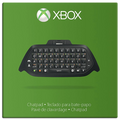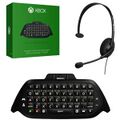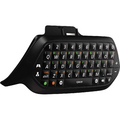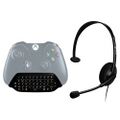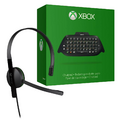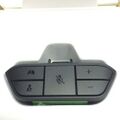More actions
This article is a stub. You can help Repair Wiki grow by expanding it
| Xbox Wireless Controller | |
|---|---|
| Manufacturer | Microsoft |
| Code name | Model 1914 |
| Release date | November 2020 |
| Device type | Game Console |
Guides
Explanatory Guides
| Type | Difficulty | |
|---|---|---|
| What's this Share button on my controller? |
Repair Guides
Create a Guide
Device pictures
-
Xbox Series Controller Carbon Black
-
Chat pad box
-
Chat pad and headset with box
-
Chat pad front
-
Chat pad side
-
Chat pad and headset with controller
-
Chat pad bottom view
-
Headset with chat pad box
-
Xbox Wireless Adapter for Computers
-
Xbox one headset adapter
-
Wireless Adapter for Windows
PCB pictures
Please consider contributing pictures to this section!
Reference measurements (also schematics if available)
Please consider contributing pictures to this section!
More Information/External Sources
The launch model that was released alongside the Xbox One console was known as Model 1537. On June 9, 2015, Microsoft unveiled the Model 1697, which added a 3.5mm audio jack and the ability to do firmware updates wirelessly. The next model, Model 1708, was released on August 2, 2016, alongside the Xbox One S console; this model added Bluetooth connectivity. The fourth and current model,
Controller variations:
Original two controllers (Models 1537 and 1697) released with the original Xbox One.
- The original two controller models (Models 1537 and 1697) have a different plastic trim around the Xbox logo and do not support Bluetooth. Model 1697 controllers added a 3.5mm audio jack, while Model 1537 controllers lack it.
- The Xbox Elite Wireless Controller and Xbox Elite Wireless Controller 2 includes more features compared to regular controller, including replaceable sticks and d-pad, four paddle buttons to back and fully rebind able button layouts.
Third model controller (Model 1708) released with the Xbox One S.
- The third standard model (Model 1708) was released along with the Xbox One S and have Bluetooth connectivity and textured grips. The Xbox logo is now surrounded by the main plastic on the front of the body.
Fourth model controller (Model 1914) released with the Xbox Series X/S.
- The fourth standard model (Model 1914) was released along with the Xbox Series X and Xbox Series S and has a slightly smaller body, a USB-C port instead of a Micro-B USB one, a Share button, and similar to the Elite Controller, it has a flat concave D-pad, textured grip and shoulder buttons. It's currently available in seven different standard colors, and numerous special edition colors.
Use with PC platforms:
Connections:
USB
- Use a USB cable to connect the controller to a USB port on the computer.
- The controller will automatically be recognized by the supported OS and install generic driver for it.
Notes
- The type of USB port on the controller end varies depending on the controller model.
Bluetooth
- Only Model 1708 and newer has built-in Bluetooth connectivity.
- Windows 10 with Anniversary update and later is required.
- It is recommended to only connect single controller with Bluetooth connection. Some accessories like headsets and chatpads do not work using wireless connection.
- The ability to use Bluetooth Low Energy protocol was added to model 1708 via the 5.11.3116.0 firmware, while model 1914 has support for Bluetooth Low Energy out of the box.
- There are multiple reports of Model 1708 controllers connected via Bluetooth causing FPS drops and stutters. These problems don't seem to happen on other Bluetooth controllers or when connected via a wireless adapter, and it's yet unknown whether the issue persists on the newer Model 1914 controllers.
- Press and hold the controller bind button between shoulder buttons for 3 seconds until Xbox button starts to blink.
- On Windows 10, access Bluetooth settings (Settings → Devices → Bluetooth), select Xbox Wireless Controller from the list and click Pair.
Notes
- To shut down the controller, hold the Xbox button for five seconds.
Wireless Adapter for Windows
Xbox Wireless Adapter for Windows (Model 1790).
- Available in two variants: An older, larger Model 1713 and a new, smaller Model 1790.
- Supports up to 8 controllers.
- Support for Windows 7 and Windows 8.1 were dropped for Model 1790.
- Connect the wireless adapter to PC and press the pair button.
- On the controller, press the controller bind button between shoulder buttons. Notes
- To shut down the controller, hold the Xbox button for five seconds.
Windows
- Connecting the controller should automatically download and install latest drivers for the controller.
| Supported features | reWASD | Steam | Gamepad Phoenix | Controller Companion |
|---|---|---|---|---|
| Vibrations | ✓ | ✓ | ✗ | ✗ |
| Impulse Trigger Vibration | ✓ | ✓ (1) | ✗ | ✗ |
| LEDs | ✓ | ✗ | ✗ | ✗ |
| Dead-zone adjustment | ✓ | ✓ | ✓ | ✗ |
| Multiple controllers | ✓ | ✓ | ✓ | ✓ |
| Chatpad | ✓ | ✗ | ✗ | ✗ |
| Headphone Jack | ✗ | ✗ | ✗ | ✗ |
| Keyboard & Mouse input emulation | ✓ | ✓ | ✗ | ✓ |
| Virtual Xbox controller emulation | ✓ | ✓ | ✓ | ✓ |
| Virtual DualShock emulation | ✓ (2) | ✗ | ✗ | ✗ |
| Virtual Nintendo controller emulation | ✓ (3) | ✗ | ✗ | ✗ |
| Retro DInput/WinMM compatibility | ~ (4) | ~ (4) | ✓ | ~ (4) |
| Battery status | ✓ | ✗ | ✗ | ✗ |
| Motion controls attachments | ✓ (5) | ✓ (6) | ✗ | ✗ |
- Requires the Xbox Extended Feature Support driver to be installed through Steam.
- Allows using controller as DualShock 3 and DualShock 4 virtual controllers.
- Allows using controller as virtual Switch Pro Controller.
- Requires Xidi wrapper.
- ReWASD allows to use Mobile gyroscope as mouse or emulated DualShock 3, DualShock 4 or Switch Pro Controller gyro. Supports attachments which emulate PlayStation or Switch controllers.
- Steam Link mobile application allows to remap phone gyro to mouse or sticks inputs. Supports attachments which emulate PlayStation or Switch controllers.
reWASD
- xʙᴏx button can be remapped.
- Support Impulse Trigger Vibration.
- Can emulate the DualShock 4 to play PS4 Remote Play, PS Now or DualShock 4 compatible games.
- Not free of charge. 7-day trial.
- Custom configs for Xbox Wireless controller can be found in official Community Configs Library maintained by reWASD users.
macOS
- Use the 360Controller driver or Xbox One Controller Enabler.
- On macOS Catalina (10.15) or later, Bluetooth support is available natively.
Linux
- Natively supported by distros using Linux kernel 3.17 (or later).
- Xow is a Linux user mode driver for the Xbox One wireless dongle. It communicates with the dongle via libusb and provides joystick input through the uinput kernel module. The input mapping is based on existing kernel drivers like xpad.
Steam
- Controller can be found in Supported Controller Database and it's correctly recognizable as Xbox One controller.
- Steam Input can support the impulse trigger using the Windows.Gaming.Input when the Xbox Extended Feature Support driver is installed through Steam.
Steam Link compatibility:
- Works without any drivers on any operating system that supports Steam.
- Can be used just to send input from a controller to a PC. Go into Streaming options, hit 𝗬 and disable video and audio streaming.
- Controller connected via USB works as expected.
- Newer versions (2016 onward, beginning with Model 1708) can be paired natively using Bluetooth.
- Steam Link has experimental support for the wireless adapter, and it works through VirtualHere too (Model 1537 and 1697).
- The controller supports Rumble over Bluetooth after update.
- May not work great unless the streaming device is connected to LAN or a low latency Wi-Fi.
Firmware updates
- Either a Windows 10/11 PC or an Xbox One/Series console is required to update the controller's firmware.
- To update the controller's firmware, install Xbox Accessories App from Microsoft Store and connect the controller either with cable or wireless adapter.
Technical information
- Model 1537: device name: Xbox One Controller, HWID: 045E:02D1.
- Model 1697: device name: Xbox One Controller, HWID: 045E:02DD.
- Model 1708: device name: Xbox Wireless Controller, HWID: 045E:02EA (USB), 045E:02E0 (Bluetooth, prior to firmware 5.11.3116.0), 045E:02FD (Bluetooth, post-firmware 5.11.3116.0), 045E:0B20 (Bluetooth Low Energy, post-firmware 5.11.3116.0).
- Model 1914: device name: Xbox Wireless Controller, HWID: 045E:0B12 (USB), 045E:0B13 (Bluetooth).
- Xbox Wireless Adapter (Model 1713): device name: Xbox Wireless Adapter for Windows, HWID: 045E:02E6
- Xbox Wireless Adapter (Model 1790): device name: Xbox Wireless Adapter for Windows, HWID: 045E:02FE
Input lag
- Wired connection input lag: 7.1 ms for button press and 7.0 ms for joystick move. Values can be improved to 5.0 ms by overclocking controller's polling rate to 1000Hz.
- Wireless connection input lag: 7.4 ms for button press and 7.0 ms for joystick move. Bluetooth connection input lag: 7.4 ms.
Chat Headset
The Xbox One Wired Chat Headset (Model 1564) is a single-ear headset with a boom microphone permanently wired to an adapter that plugs into the rectangular expansion port on the bottom edge of the Xbox One controller; it also engages the two round holes flanking the expansion port with plastic alignment prongs for stability. There are three buttons on the adapter, which allow the player to adjust chat volume and mute the microphone. A version of the Chat Headset was later available with a standard 3.5 mm headphone jack instead of the adapter; on the updated version, the controls were on a small plastic pod inline with the cable.
Stereo Headset Adapter
The original Xbox One Wireless Controller (Model 1537) has no 3.5 millimeter headset jack on the bottom edge of the controller. The Xbox One Stereo Headset Adapter (Model 1626) allows the use of stereo headsets with 3.5 millimeter headphone jacks using the rectangular expansion port on the bottom center of all Microsoft Xbox One controllers, including the original (Model 1537). The Stereo Headset Adapter includes five buttons which allow the player to balance chat and in-game audio output levels, adjust overall volume, and mute the chat microphone. It was available both separately and in a bundle with the Xbox One Stereo Headset (Model 1610).
Chatpad
The Microsoft Chatpad keyboard attachment (Model 1676), similar to the Xbox 360 Messenger Kit, was unveiled at Gamescom on August 4, 2015. The Chatpad also includes the functions of the Stereo Headset Adapter and was bundled with the updated version of the Chat Headset terminating in a 3.5 mm headphone jack. In addition, the Chatpad features two dedicated programmable keys; the default behavior allowed the player to record screenshots (X1) and gameplay clips (X2) without using a software menu, if that functionality is enabled in the Xbox Dashboard settings.
Play and Charge Kit
The Play and Charge Kit was renamed to the Xbox Rechargeable Battery + USB-C Cable and released for the Series X/S controllers in 2020. The rechargeable battery pack is physically identical to the older version, and the update to the kit is limited to the bundled cable, which is now a 9 ft (2.7 m) USB-A to USB-C cable instead of micro-USB. The indicator light has been dropped from the updated cable.
Xbox Wireless Adapter for Windows
The Xbox Wireless Adapter for Windows (Model 1713) is a USB-A dongle with a single button that allows computers using the Windows 10 and Windows 11 operating system to connect with Xbox controllers, headsets, and similar accessories via the proprietary Xbox Wireless protocol rather than Bluetooth. It was announced in June 2015 and began shipping in October of that year. Support for Windows 7 and 8.1 was added through new drivers in December 2015. It is equipped with a single white LED to indicate pairing and wireless connection status.
A revised version, now named the Xbox Wireless Adapter for Windows 10 (Model 1790) was introduced in August 2017 with a smaller size, reducing the risk of obstructing adjacent USB ports. The revised Model 1790 drops support for Windows 7 and 8.1.


